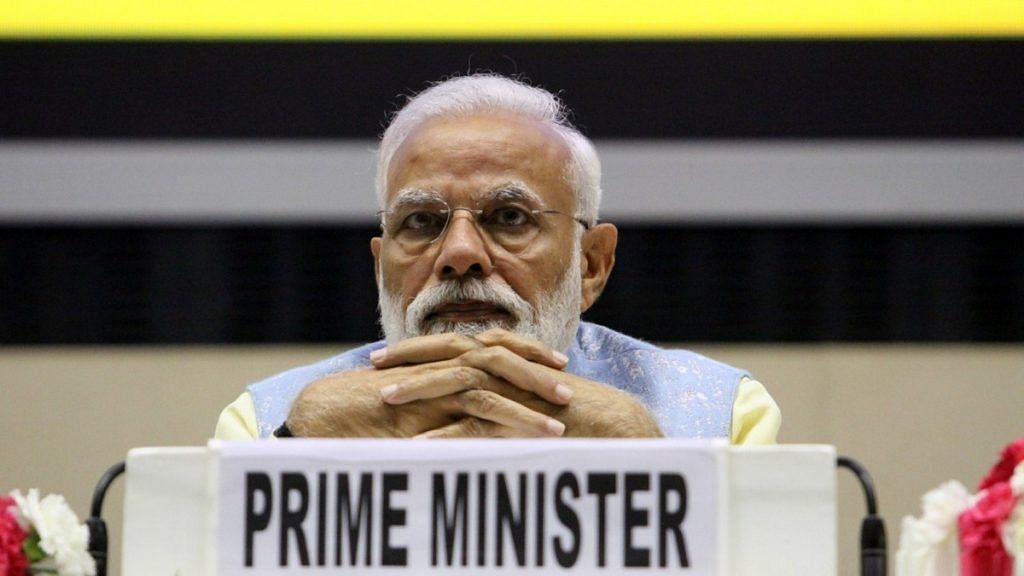New Delhi: The Narendra Modi government has decided after much deliberation that it won’t roll back its revised foreign direct investment (FDI) norms that are aimed at preventing predatory deals from China, ThePrint has learnt.
The decision comes days after Beijing described as “discriminatory” a new Indian rule that mandates companies from “border-sharing countries” to seek government approval before making investments in the country.
According to two sources, the Modi government is “firm on its stance” that foreign capital from “border-sharing countries” should come in with prior government approval.
The basic aim behind amending the FDI policy last week was to “curb hostile or opportunistic takeovers that Beijing has been engaging in”, said the sources.
They added that the decision had been under discussion “for a long time” and wasn’t a “knee-jerk reaction” to the global discourse on China’s alleged culpability in spreading the Covid-19 pandemic.
“This was a bothersome issue for years now. So this is not a knee-jerk reaction to what’s happening now. Chinese companies are using market forces of democratic countries to acquire companies through M&As (mergers and acquisitions) with the aim of getting larger control and ownership,” said a senior government official involved in the discussions.
“So there is no question of reviewing it,” the official added.
The official said the government had “sufficient” checks and balances to ensure that open markets, such as India’s, don’t come under threat in a post-Covid world when economies around the globe “become more vulnerable than ever”.
“We are not stopping China from investing in India. We have just added a condition that any money put in by them will have to undergo government scrutiny,” said a second official.
Also read: Not just US, its adversaries China and Russia are struggling under Covid-19 too
What China has said
In response to the Modi government’s FDI decision, China said earlier this week that its cumulative investment in India exceeded $8 billion, which was “far more than the total investments of India’s other border-sharing countries”.
India shares land borders with China, Pakistan, Bangladesh, Myanmar, Nepal, Bhutan and Afghanistan.
The amendment will prove “additional barriers” for investing in India, Beijing said, adding that it violated global trading norms under the World Trade Organisation (WTO) and G20 consensus. It had called for the policy to be revised.
“The additional barriers set by Indian side for investors from specific countries violate WTO’s principle of non-discrimination, and go against the general trend of liberalisation and facilitation of trade and investment,” said a statement by the Chinese Embassy in India.
China also urged India to adhere to the consensus by all G20 member countries to “realise a free, fair, non-discriminatory, transparent, predictable and stable trade and investment environment, and to keep our markets open”.
‘Underestimate the amount’
According to a 30 March Brookings India report, Following the money: China Inc’s growing stake in India-China relations, the Chinese commerce ministry’s official investment figures “underestimate the amount of investment” in India.
The report, by Ananth Krishnan, a visiting fellow at Brookings India, states the official figures “neither account for all Chinese companies’ acquisitions of stakes in the technology sector, nor investments from China routed through third-party countries, such as Singapore”.
“The flush of investment from China’s private sector poses new challenges for India’s regulators and has underlined the need for a transparent, credible and predictable regulatory framework,” it said.
“In China, the boundaries between the state and private sectors are blurry at best, and some of China’s most prominent private technology companies, including those that are major investors in India, are playing key roles in advancing government initiatives at home, including in running an effective censorship regime,” it added.
Also read: China ‘will pay a price’ for causing ‘huge challenge’ to global economy, says Mike Pompeo
